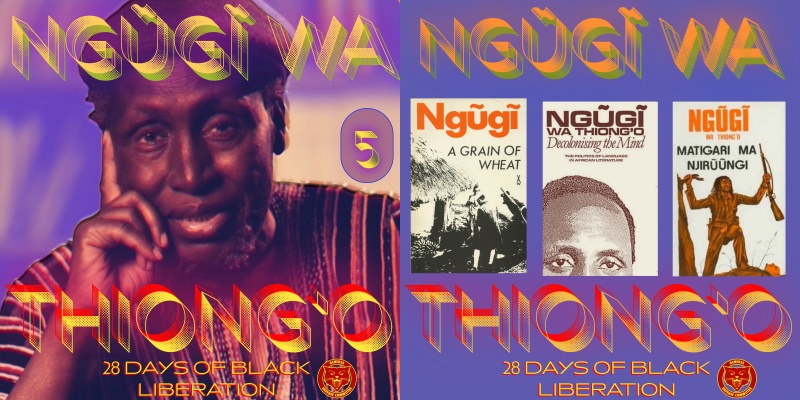Day 5 of the 28 Days of Black Liberation 2024 series
Black intellectual tradition has given so much to the rest of the world … but this is often invisible”. Ngũgĩ wa Thiong’o is a revolutionary Kenyan novelist and was once a political prisoner in Kenya. He is known for writing plays, books, and Essays. Ngugi wa Thiong’o was born in 1938, he grew up in Kenya when it was colonized by the British, this greatly influenced his craft. Ngugi wa Thiong’o is known for writing on the impact colonialism has had on the people of Africa as well as injustice in his own country during a dictatorship. Ngugi was not only an author he was a professor at University of Nairobi for ten years (1967-1977), while being a professor he advocated for the department to be called literature instead of English literature. He was known for being very political in his department, and felt Africa and third world countries should be the center of their department and not western literature. In the 1960’s it was changed to African literature both written and oral.
After being a professor a decade he returned to writing novels in 1977. Petals of the blood, the first novel he wrote in over ten years, painted the picture of neo-colonial Kenya. That same year Ngugi wa Thiong’o wrote a play called Ngaahika Ndeenda, which was very controversial and landed him in jail. Ngaahika Ndeenda was a play that discussed the issues of class, gender, sexuality, spirituality, traditional culture and more. Class struggle was the main theme of the play, and the reason the dictator (Moi) wanted him in prison. Ngugi was released from prison a year later due to political campaigns naming him a prisoner of conscience. Ngugi was in prison for a year but when he returned he could no longer work in Kenya and all of his work was banned from all Kenya’s bookstores and libraries forcing him to travel around the world to continue to work. He was exiled from his home country (for several decades), and even survived an attempted assassination, but he never stopped writing.
“He carried the Bible; the soldier carried the gun; the administrator and the settler carried the coin. Christianity, Commerce, Civilization: the Bible, the Coin, the Gun: Holy Trinity.”
In the United States, the Black liberation struggle is the vanguard of the revolutionary class struggle. Black resistance to white supremacy has been the catalyst for nearly all critical social ruptures throughout american history. White workers choosing an alliance with the bosses instead of siding with the rest of the working class is the primary roadblock to revolutionary anti-capitalism in the US.
The GDC celebrates the Black liberation struggle and draws inspiration and lessons from its proud history in our struggle for the new world we are fighting for. In February we celebrate Black revolutionary culture, political prisoners, international figures and struggles, and moments in direct action that guide us in our continued, collective fight for liberation!

